华盛顿欧文简介
美国浪漫主义时期文学家及其作品
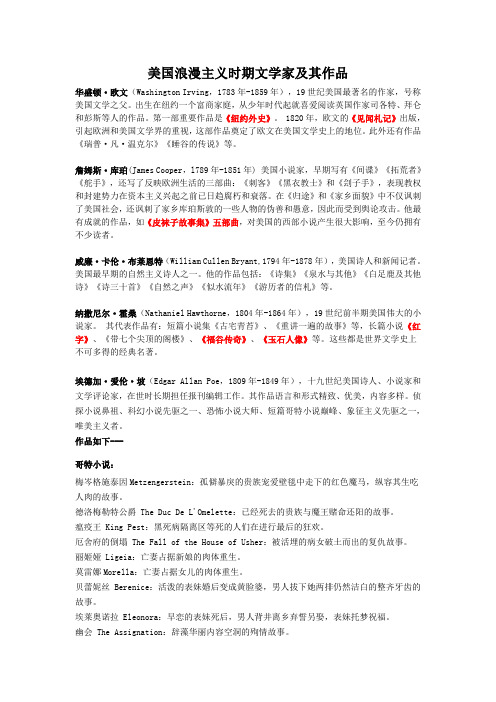
美国浪漫主义时期文学家及其作品华盛顿·欧文(Washington Irving,1783年-1859年),19世纪美国最著名的作家,号称美国文学之父。
出生在纽约一个富商家庭,从少年时代起就喜爱阅读英国作家司各特、拜仑和彭斯等人的作品。
第一部重要作品是《纽约外史》。
1820年,欧文的《见闻札记》出版,引起欧洲和美国文学界的重视,这部作品奠定了欧文在美国文学史上的地位。
此外还有作品《瑞普·凡·温克尔》《睡谷的传说》等。
詹姆斯·库珀(James Cooper,l789年-1851年) 美国小说家,早期写有《间谍》《拓荒者》《舵手》,还写了反映欧洲生活的三部曲:《刺客》《黑衣教士》和《刽子手》,表现教权和封建势力在资本主义兴起之前已日趋腐朽和衰落。
在《归途》和《家乡面貌》中不仅讽刺了美国社会,还讽刺了家乡库珀斯敦的一些人物的伪善和愚意,因此而受到舆论攻击。
他最有成就的作品,如《皮袜子故事集》五部曲,对美国的西部小说产生很大影响,至今仍拥有不少读者。
威廉·卡伦·布莱恩特(William Cullen Bryant,1794年-1878年),美国诗人和新闻记者。
美国最早期的自然主义诗人之一。
他的作品包括:《诗集》《泉水与其他》《白足鹿及其他诗》《诗三十首》《自然之声》《似水流年》《游历者的信札》等。
纳撒尼尔·霍桑(Nathaniel Hawthorne,1804年-1864年),19世纪前半期美国伟大的小说家。
其代表作品有:短篇小说集《古宅青苔》、《重讲一遍的故事》等,长篇小说《红字》、《带七个尖顶的阁楼》、《福谷传奇》、《玉石人像》等。
这些都是世界文学史上不可多得的经典名著。
埃德加·爱伦·坡(Edgar Allan Poe,1809年-1849年),十九世纪美国诗人、小说家和文学评论家,在世时长期担任报刊编辑工作。
英美文学-欧文Washington Irving
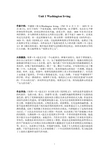
Unit 1 Washington Irving作家介绍:华盛顿·欧文(Washington Irving,1783 年4 月3 日–1859年11月28日),出生于纽约一个富商家庭。
幼年体弱多病,16岁辍学,先后在几个律师事务所学法律,但对法律并没有兴趣,喜爱文学、旅游。
1806年在弗吉尼亚州任律师,并与律师霍夫曼的女儿玛蒂尔达订婚。
妻子早逝于1809年,后来虽有过几次恋爱,却一直过着独身生活。
欧文的第一部重要作品是《纽约外史》。
1820年,他的《见闻札记》出版,引起欧洲和美国文学界的重视,也奠定了他在美国文学史上的地位。
该作品包含了他最为脍炙人口的名篇《瑞普·凡·温克尔》和《睡谷的传说》。
晚年他在曾描写过的睡谷附近度过。
因其对美国文学的巨大贡献,欧文被尊称为“美国文学之父”。
内容摘要:瑞普·凡·温克尔是一个心底善良、和蔼可亲的人。
他乐于帮助别人,但在自己家里却十分懒惰。
有一天,为了躲避唠叨凶悍的妻子,他独自到附近的赫德森河畔兹吉尔山上去打猎。
途中,他巧遇了当年发现这条河的赫德森船长及其伙伴,在喝了他们的仙酒后,睡了一觉。
醒后下山回家,才发现时间已过了整整二十年,人世沧桑,一切都十分陌生。
原本闭塞的山村现在一片沸腾,到处是演说、传单、竞选。
恍惚中,瑞普发现酒店招牌上英王乔治的画像变了。
红色的上衣变成了蓝黄色,手中的王笏变成宝剑,头冠三角帽,下面是”华盛顿将军”的字眼。
经过一番曲折后,瑞普终于知道,他现在已由英王的臣民变成”合众国的一个自由的公民”。
但对所有这些变化,瑞普无动于衷,因为他最担心的是家“女人的专政”。
作品导读:《瑞普·凡·温克尔》出自欧文的《见闻札记》。
该作品是作家最知名的代表作,包括小说、散文、杂感等32篇,以幽默风趣的笔调和富于幻想的浪漫色彩,描写了英国和美国古老的风俗习惯以及善良淳朴的旧式人物。
作家喜欢田园生活和古代遗风,爱写随笔和短篇小说,尤为关注奇闻轶事和穷乡僻壤的风俗习惯。
华盛顿·欧文——美国文学之父
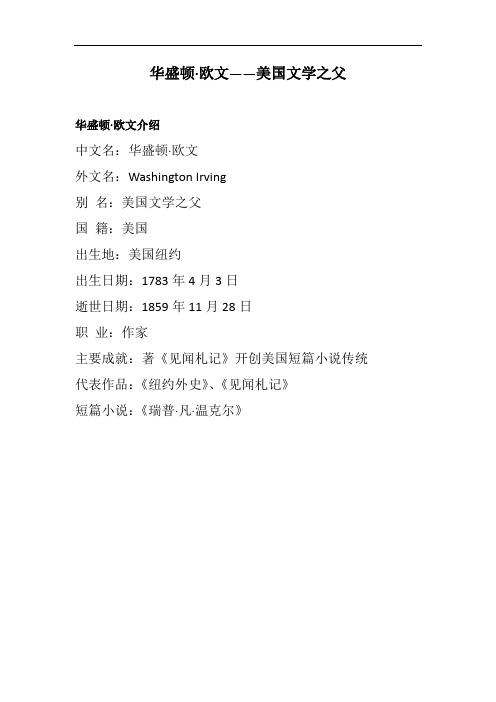
华盛顿·欧文——美国文学之父华盛顿·欧文介绍中文名:华盛顿·欧文外文名:Washington Irving别名:美国文学之父国籍:美国出生地:美国纽约出生日期:1783年4月3日逝世日期:1859年11月28日职业:作家主要成就:著《见闻札记》开创美国短篇小说传统代表作品:《纽约外史》、《见闻札记》短篇小说:《瑞普·凡·温克尔》华盛顿·欧文是19世纪美国最著名的作家,号称美国文学之父。
1783年4月3日出生在纽约一个富商家庭。
从欧文少年时代起就喜爱阅读英国作家司各特、拜伦和彭斯等人的作品。
欧文的第一部重要作品是《纽约外史》。
1819年,欧文的《见闻札记》出版,引起欧洲和美国文学界的重视,这部作品奠定了欧文在美国文学史上的地位。
生平介绍早年经历华盛顿·欧文,美国作家。
出生于纽约。
他的父亲是纽约富有的五金商人,长老会执事,政治上反对英国殖民统治;他敬重华盛顿,因而给儿子取名为华盛顿。
欧文幼年体弱多病,16岁辍学,先后在几个律师事务所学法律,但对法律并没有兴趣,喜爱文学,从小喜欢看《鲁滨逊漂流记》、《格列佛游记》这种历险故事,还常常钻到剧院里去看戏。
欧文后来最知名的作品是《见闻札记》,写的就是在外游历的故事,不能不说是幼时受到了读书的影响。
1802年,19岁的欧文在《早晨纪事报》上发表了几篇书信体散文,崭露头角。
1804年因病赴欧洲休养,到过法国、意大利和英国,作了大量旅途笔记,为以后的创作积累了丰富的素材,一度想成为画家。
1806年回国后在弗吉尼亚州任律师,后帮助他的两个哥哥经营进口生意。
他对法律和经商之道都不甚精通。
这时他与律师霍夫曼的女儿玛蒂尔达订婚,妻子早逝于1809年,后来他虽有过几次恋爱,却一直过着独身生活。
1807年,他和哥哥威廉等人共同创办一种不定期刊物《杂拌》,沿袭18世纪英国作家乔纳森·斯威夫特、亨利·菲尔丁以及约瑟夫·艾迪生和理查德·斯梯尔的《旁观者》的传统,开始了他的文学创作活动,显露出他的幽默、风趣和含蓄的讽刺才能。
华盛顿欧文

华盛顿·欧文(1783-1859)是美国历史上第一位享有国际声誉的作家。
曾任美国驻伦敦使馆秘书和美国驻西班牙公使。
1783年4月3日出生在纽约一个富商家庭。
欧文从少年时代起就喜爱阅读英国作家司各特、拜仑和彭斯等人的作品。
欧文的第一部重要作品是《纽约外史》,1820年,欧文的《见闻札记》出版,引起欧洲和美国文学界的重视,这部作品奠定了欧文在美国文学史上的地位。
之后,欧文又创作了多部作品,如:《阿尔罕伯拉》、《攻克格拉纳达》、《哥伦布传》等等。
欧文是散文大师,是美国文学奠基人之一。
他的文笔优雅自然,清新精致,时常流露出温和的幽默。
1859年11月28日,欧文与世长辞,美国人民为了怀念这位在文学方面做出突出贡献的作家,在纽约下半旗致哀,而欧文的许多优秀作品则被人们传诵至今,成为珍贵的文学遗产。
他本人更被尊为“美国文学之父”。
1783年,欧文出生在纽约的一个富人家庭,他从小喜欢看《鲁滨逊漂流记》、《格列佛游记》这种历险故事,还常常钻到剧院里去看戏。
欧文后来最知名的作品是《见闻札记》,写的就是在外游历的故事,不能不说是幼时受到了读书的影响。
早期翻译名家林纾将《见闻札记》译成中文,取名《拊掌录》,这是欧文作品的第一个中译本。
林纾在序中说:“欧文气量宏广,而思致深邃而便敏,行文跳踊变化,匪夷所思。
其雅趣高情……又博古,广哀遗典,叩以所有,无不立应。
”给予了他很高的评价。
1809年,他的第一部作品《纽约外史》以“迪德里希·尼克博克”的笔名出版。
这是一部具有独特风格的诙谐之作,充分显露出欧文的幽默才能。
《纽约外史》出版后,欧文便成为纽约文坛风靡一时的人物。
在这之前,美国虽然获得独立已有三十余年,但在文学方面却始终未能摆脱英国的束缚,创作出足以代表这个新兴资产阶级共和国的作品来。
欧文运用本国题材写出的《纽约外史》这部具有民族特色的作品,对于促进美国民族文学的发展有着重要的意义。
1815年,欧文再度赴英。
中文稿华盛顿欧文的哥特创作手法解读

华盛顿欧文的哥特创作手法——以《睡谷传说》为例1、Introduction华盛顿欧文是对美国文学发展做出巨大贡献的伟大作家,被称为美国小说之父,其作品大都幽默风趣,语言优美富有诗意,但也有作品体现了哥特文学的风格,最典型的就是《睡谷传说》。
华盛顿·欧文(1783—1859)是一位享誉国际的文学家,十九世纪最伟大的美国散文家之一。
他一七八三年生于纽约,幼年时体弱多病,十六岁辍学学习法律,但他喜爱的是文学,并且读了不少文学作品。
一八零四年至一八零六年间他因病赴欧洲修养,回国后取得律师资格。
一八零七年,他和哥哥威廉等人共同创办一种不定期刊物《杂拌》,开始了他的文学创作活动,显露出他的幽默、风趣和含蓄的讽刺才能。
他的第一部重要作品是《纽约外史》(1809)。
一八一八年后他留居英国,以写作为生,陆续发表许多散文、随笔和故事,共三十二篇,于一八二零年结集为《见闻札记》出版,引起欧洲和美国文学界的重视。
这部作品奠定了欧文在美国文学史上的地位,其中的散文《威斯敏斯特教堂》、短篇小说《瑞普·凡·温克尔》和《睡谷的传说》等,都是脍炙人口的佳作。
继《见闻札记》后,欧文写了体裁相似的《布雷斯布里奇田庄》(1822)和故事集《旅客谈》(1824)。
一八二六年,欧文在马德里任美国驻西班牙大使馆馆员。
一八二八年,他发表《哥伦布的生平和航行》;一八二九年发表《攻克格拉纳达》,同年又出版游记、随笔集和故事集《阿尔罕伯拉》(1832)。
他的晚年是在他曾经描写过的睡谷附近度过的,并写了三部传记:《哥尔德斯密斯传》(1840)、《穆罕默德及其继承者》(1849——1850)和五卷本《华盛顿传》(1855——1859)。
欧文的文笔优雅自然,充满浪漫气息,他的散文和短篇小说具有经久不衰的风采和魅力。
《睡谷传说》讲述了教书匠Crane追求漂亮姑娘却被情敌恶整的故事。
作品中出现了很多对环境及情节的描写,环境多是阴森恐怖,情节也是曲折离奇,整个故事鬼气森森,弥漫着浓厚的哥特色彩,带给读者极大的感官刺激。
Rip_Van_Winkle_原文
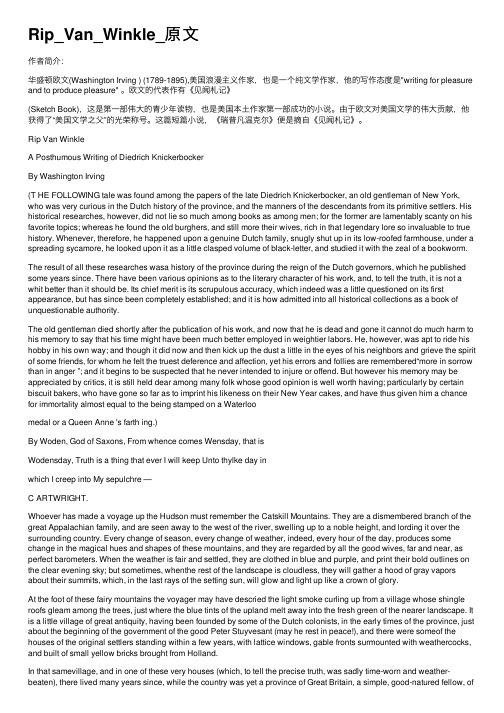
Rip_Van_Winkle_原⽂作者简介:华盛顿欧⽂(Washington Irving ) (1789-1895),美国浪漫主义作家,也是⼀个纯⽂学作家,他的写作态度是"writing for pleasure and to produce pleasure" 。
欧⽂的代表作有《见闻札记》(Sketch Book),这是第⼀部伟⼤的青少年读物,也是美国本⼟作家第⼀部成功的⼩说。
由于欧⽂对美国⽂学的伟⼤贡献,他获得了“美国⽂学之⽗”的光荣称号。
这篇短篇⼩说,《瑞普凡温克尔》便是摘⾃《见闻札记》。
Rip Van WinkleA Posthumous Writing of Diedrich KnickerbockerBy Washington Irving(T HE FOLLOWING tale was found among the papers of the late Diedrich Knickerbocker, an old gentleman of New York, who was very curious in the Dutch history of the province, and the manners of the descendants from its primitive settlers. His historical researches, however, did not lie so much among books as among men; for the former are lamentably scanty on his favorite topics; whereas he found the old burghers, and still more their wives, rich in that legendary lore so invaluable to true history. Whenever, therefore, he happened upon a genuine Dutch family, snugly shut up in its low-roofed farmhouse, under a spreading sycamore, he looked upon it as a little clasped volume of black-letter, and studied it with the zeal of a bookworm. The result of all these researches wasa history of the province during the reign of the Dutch governors, which he published some years since. There have been various opinions as to the literary character of his work, and, to tell the truth, it is not a whit better than it should be. Its chief merit is its scrupulous accuracy, which indeed was a little questioned on its first appearance, but has since been completely established; and it is how admitted into all historical collections as a book of unquestionable authority.The old gentleman died shortly after the publication of his work, and now that he is dead and gone it cannot do much harm to his memory to say that his time might have been much better employed in weightier labors. He, however, was apt to ride his hobby in his own way; and though it did now and then kick up the dust a little in the eyes of his neighbors and grieve the spirit of some friends, for whom he felt the truest deference and affection, yet his errors and follies are remembered“more in sorrow than in anger ”; and it begins to be suspected that he never intended to injure or offend. But however his memory may be appreciated by critics, it is still held dear among many folk whose good opinion is well worth having; particularly by certain biscuit bakers, who have gone so far as to imprint his likeness on their New Year cakes, and have thus given him a chance for immortality almost equal to the being stamped on a Waterloomedal or a Queen Anne 's farth ing.)By Woden, God of Saxons, From whence comes Wensday, that isWodensday, Truth is a thing that ever I will keep Unto thylke day inwhich I creep into My sepulchre —C ARTWRIGHT.Whoever has made a voyage up the Hudson must remember the Catskill Mountains. They are a dismembered branch of the great Appalachian family, and are seen away to the west of the river, swelling up to a noble height, and lording it over the surrounding country. Every change of season, every change of weather, indeed, every hour of the day, produces some change in the magical hues and shapes of these mountains, and they are regarded by all the good wives, far and near, as perfect barometers. When the weather is fair and settled, they are clothed in blue and purple, and print their bold outlines on the clear evening sky; but sometimes, whenthe rest of the landscape is cloudless, they will gather a hood of gray vapors about their summits, which, in the last rays of the setting sun, will glow and light up like a crown of glory.At the foot of these fairy mountains the voyager may have descried the light smoke curling up from a village whose shingle roofs gleam among the trees, just where the blue tints of the upland melt away into the fresh green of the nearer landscape. It is a little village of great antiquity, having been founded by some of the Dutch colonists, in the early times of the province, just about the beginning of the government of the good Peter Stuyvesant (may he rest in peace!), and there were someof the houses of the original settlers standing within a few years, with lattice windows, gable fronts surmounted with weathercocks, and built of small yellow bricks brought from Holland.In that samevillage, and in one of these very houses (which, to tell the precise truth, was sadly time-worn and weather-beaten), there lived many years since, while the country was yet a province of Great Britain, a simple, good-natured fellow, ofthe name of Rip Van Winkle. He was a descendant of the Van Winkles who figured so gallantly in the chivalrous days of Peter Stuyvesant, and accompanied him to the siege of Fort Christina. He inherited, however, but little of the martial character of his ancestors. I have observed that he was a simple, good-natured man; he was, moreover, a kind neighbor and an obedient, henpecked husband. Indeed, to the latter circumstance might be owing that meeknessof spirit which gained him such universal popularity; for those men are most apt to be obsequious and conciliating abroad who are under the discipline of shrews at home. Their tempers, doubtless, are rendered pliant and malleable in the fiery furnace of domestic tribulation, and a curtain lecture is worth all the sermons in the world for teaching the virtuesof patience and long-suffering. A termagant wife may, therefore, in some respects, be considered a tolerable blessing; and if so, Rip Van Winkle was thrice blessed.Certain it is that he was a great favorite among all the good wives of the village, who, as usual with the amiable sex, took his part in all family squabbles, and never failed, whenever they talked those matters over in their evening gossipings, to lay all the blame on DameVan Winkle. The children of the village, too, would shout with joy whenever he approached. He assisted at their sports, made their playthings, taught them to fly kites and shoot marbles, and told them long stories of ghosts, witches, and Indians. Whenever he went dodging about the village, he was surrounded by a troop of them, hanging on his skirts, clambering on his back, and playing a thousand tricks on him with impunity; and not a dog would bark at him throughout the neighborhood.The great error in Rip's composition was an insuperable aversion to all kinds ofprofitable labor. It could not be from the want of assiduity or perseverance; for he would sit on a wet rock, with a rod as long and heavy as a Tartar 's lance, and fish all day without a murmur, even though he should not be encouraged by a single nibble. He would carry a fowling piece on his shoulder, for hours together, trudging through woods and swamps,and up hill and downdale, to shoot a few squirrels or wild pigeons. He would never even refuse to assist a neighbor in the roughest toil, and was a foremost man at all country frolics for husking Indian corn, or building stone fences. The women of the village, too, used to employ him to run their errands, and to do such little odd jobs as their less obliging husbands would not do for them; in a word, Rip was ready to attend to anybody's business but his own; but as to doing family duty, and keeping his farm in order, it was impossible.In fact, he declared it was of no use to work on his farm; it was the most pestilent little piece of ground in the whole country; everything about it went wrong, and would go wrong, in spite of him. His fences were continually falling to pieces; his cow would either go astray or get among the cabbages; weeds were sure to grow quicker in his fields than anywhere else; the rain always madea point of setting in just as he had someoutdoor work to do; so that though his patrimonial estate had dwindled away under his management, acre by acre, until there was little more left than a mere patch of Indian corn and potatoes, yet it was the worst-conditioned farm in the neighborhood.His children, too, were as ragged and wild as if they belonged to nobody. His son Rip, an urchin begotten in his own likeness, promised to inherit the habits, with the old clothes of his father. He was generallyseen trooping like a colt at his mother 's heels, equipped in a pair ofhis father ' s cast -off galligaskins, which he had muchado to hold up with one hand, as a fine lady does her train in bad weather.Rip Van Winkle, however, was one of those happy mortals, of foolish, well-oiled dispositions, whotake the world easy, eat white bread or brown, whichever can be got with least thought or trouble, and would rather starve on a penny than work for a pound. If left to himself, he would have whistled life away, in perfect contentment; but his wife kept continually dinning in his ears about his idleness, his carelessness, and the ruin he was bringing on his family. Morning, noon, and night, her tongue was incessantly going, and everything he said or did was sure to produce a torrent of household eloquence. Rip had but one way of replying to all lectures of the kind, and that, by frequent use, had grown into a habit. He shrugged his shoulders, shook his head, cast up his eyes, but said nothing. This, however, always provoked a fresh volley from his wife, so that he was fain to draw off his forces, and take to the outside of the house—the only side which, in truth, belongs to a henpecked husband. Rip's sole domestic adherent was his dog Wolf, who was as much henpecked as his master; for DameVan Winkle regarded them as companions in idleness, and even looked upon Wolf with an evil eye, as the cause of his master 's so often going astray. True it is, in all points of spirit befitting an honorable dog, he was as courageous an animal as ever scoured the woods—but what courage can withstand the ever-during and all-besetting terrors of a woman' s tongue? The momentWolf entered the househis crest fell, his tail drooped to the ground, or curled between his legs; he sneaked about with a gallows air, casting many a sidelong glance at Dame Van Winkle, and at the least flourish of a broomstick or ladle would fly to the door with yelping precipitation.Times grew worse and worse with Rip Van Winkle as years of matrimony rolled on; a tart temper never mellows with age,and a sharp tongue is the only edged tool that grows keener by constant use. For a long while he used to console himself, when driven from home, by frequenting a kind of perpetual club of the sages, philosophers, and other idle personages of the village, which held its sessions on a bench before a small inn, designated by a rubicund portrait of his majesty George the Third. Here they used to sit in the shade, of a long lazy summer 's day, talking listlessly over village gossip, or telling endless sleepy stories about nothing. But it would have been worth any statesman 's moneyto have heard the profound discussions which sometimes took place, when by chance an old newspaper fell into their hands, from some passing traveler. How solemnly they would listen to the contents, as drawled out by Derrick Van Bummel, the schoolmaster, a dapper, learned little man, who was not to be daunted by the most gigantic word in the dictionary; and how sagely they would deliberate upon public events somemonths after they had taken place.The opinions of this junto were completely controlled by Nicholas Vedder, a patriarch of the village, and landlord of the inn, at the doorof which he took his seat from morning till night, just moving sufficiently to avoid the sun, and keep in the shade of a large tree; so that the neighbors could tell the hour by his movements as accurately as by a sun-dial. It is true, he was rarely heard to speak, but smoked his pipe incessantly. His adherents, however (for every great man has his adherents), perfectly understood him, and knew howto gather his opinions. When anything that was read or related displeased him, he was observed to smoke his pipe vehemently, and send forth short, frequent, and angry puffs; but when pleased, he would inhale the smoke slowly and tranquilly, and emit it in light and placid clouds, and sometimes taking the pipe from his mouth, and letting the fragrant vapor curl about his nose, would gravely nod his head in token of perfect approbation.From even this stronghold the unlucky Rip was at length routed by his termagant wife, who would suddenly break in upon the tranquillity of the assemblage, and call the members all to nought; nor was that august personage, Nicholas Vedder himself, sacred from the daring tongue of this terrible virago, who charged him outright with encouraging her husband in habits of idleness.Poor Rip was at last reduced almost to despair; and his only alternative, to escape from the labor of the farm and clamor of his wife, was to take gun in hand and stroll away into the woods. Here he would sometimes seat himself at the foot of a tree, and share the contents of his wallet with Wolf, with whom he sympathized as a fellow-sufferer in persecution. “Poor Wolf, ” he would say, “thy mistress leads thee a dog's life of it; but never mind, my lad, while I live thou shalt neverwant a friend to stand by thee! ” Wolf would wag his tail, look wistfully in his master 's face, and if dogs can feel pity, I verily believe he reciprocated the sentiment with allhis heart.In a long ramble of the kind on a fine autumnal day, Rip had unconsciously scrambled to one of the highest parts of the Catskill Mountains. He was after his favorite sport of squirrel shooting, and the still solitudes had echoed and re?choed with the reports of his gun. Panting and fatigued, he threw himself, late in the afternoon, on a green knoll, covered with mountain herbage, that crowned the brow of a precipice. From an opening between the trees he could overlook all the lower country for manya mile of rich woodland. He saw at a distance the lordly Hudson, far, far below him, moving on its silent but majestic course, the reflection of a purple cloud, or the sail of a lagging bark, here and there sleeping on its glassy bosom, and at last losing itself in the blue highlands.On the other side he looked down into a deep mountain glen, wild, lonely, and shagged, the bottom filled with fragments from the impending cliffs, and scarcely lighted by the reflected rays of the setting sun.For sometime Rip lay musing on this scene; evening was gradually advancing; the mountains began to throw their long blue shadows over the valleys; he saw that it would be dark long before he could reach the village, and he heaved a heavy sigh when he thought of encountering the terrors of Dame Van Winkle.As he was about to descend, he heard a voice from a distance, hallooing, “Rip Van Winkle! Rip Van Winkle! ” Helooked around, but could see nothing but a crow winging its solitary flight across the mountain. He thought his fancy must have deceived him, and turned again to descend, when he heard the same cry ring through the still evening air: “Rip Van Winkle! Rip Van Winkle! ”—at the same time Wolf bristled up his back, and giving a low growl, skulked to his master 's side, looking fearfully down intothe glen. Rip now felt a vague apprehension stealing over him; he looked anxiously in the same direction, and perceived a strange figure slowly toiling up the rocks, and bending under the weight of something he carried on his back. He was surprised to see any human being in this lonely and unfrequented place, but supposing it to be some one of the neighborhood in need of assistance, he hastened down to yield it.On nearer approach, he was still more surprised at the singularity of the stranger 's appearance. He was a short, square-built old fellow, with thick bushy hair, and a grizzled beard. His dress was of the antique Dutch fashion —a cloth jerkin strapped around the waist —several pair of breeches, the outer one of ample volume, decorated with rows of buttons downthe sides,and bunches at the knees. He bore on his shoulders a stout keg, that seemed full of liquor, and made signs for Rip to approach and assist him with the load. Though rather shy and distrustful of this new acquaintance, Rip complied with his usual alacrity, and mutually relieving one another, they clambered up a narrow gully, apparently the dry bed of a mountain torrent. As they ascended, Rip every now and then heard long rolling peals, like distant thunder, that seemedto issue out of a deep ravine, or rather cleft between lofty rocks, toward which their rugged path conducted. He paused for an instant, but supposing it to bethe muttering of one of those transient thunder showers which often take place in mountain heights, he proceeded. Passing through the ravine, they cameto a hollow, like a small amphitheater, surrounded by perpendicular precipices, over the brinks of which impending trees shot their branches, so that you only caught glimpses of the azure sky and the bright evening cloud. During the whole time, Rip and his companion had labored on in silence; for though the former marveled greatly what could be the object of carrying a keg of liquor up this wild mountain, yet there was something strange and incomprehensible about the unknown that inspired awe and checked familiarity.On entering the amphitheater, new objects of wonder presented themselves. On a level spot in the center was a company of odd-looking personages playing at ninepins. They were dressed in a quaint, outlandishfashion: some wore short doublets, others jerkins, with long knives in their belts, and most had enormous breeches, of similar style with that of the guide 's. Their visages, too, were peculiar: one had a large head, broad face, and small, piggish eyes; the face of another seemedto consist entirely of nose, and was surmounted by a white sugar-loaf hat set off with a little red cock 's tail. They all had beards, of various shapesand colors. There was one who seemed to be the commander. He was a stout old gentleman, with a weather-beaten countenance; he wore a laced doublet, broad belt and hanger, high-crowned hat and feather, red stockings, and high-heeled shoes, with roses in them. The whole group reminded Rip of the figures in an old Flemish painting, in the parlor of Dominie Van Schaick, the village parson, and which had been brought over from Holland at the time of the settlement.What seemedparticularly odd to Rip, was that though these folks were evidently amusing themselves, yet they maintained the gravest faces, the most mysterious silence, and were, withal, the most melancholy party of pleasure he had ever witnessed. Nothing interrupted the stillness of the scene but the noise of the balls, which, whenever they were rolled, echoed along the mountains like rumbling peals of thunder.As Rip and his companion approached them, they suddenly desisted from their play, and stared at him with such fixed statue-like gaze, and suchstrange, uncouth, lack-luster countenances, that his heart turned within him, and his knees smote together. His companion now emptied the contents of the keg into large flagons, and made signs to him to wait upon the company. He obeyed with fear and trembling; they quaffed the liquor in profound silence, and then returned to their game.By degrees, Rip's aweand apprehension subsided. He even ventured, when no eye was fixed upon him, to taste the beverage, which he found had much of the flavor of excellent Hollands. He was naturally a thirsty soul, and was soon tempted to repeat the draught. One taste provoked another, and he reiterated his visits to the flagon so often, that at length his senses were overpowered, his eyes swamin his head, his head gradually declined, and he fell into a deep sleep.On awaking, he found himself on the green knoll from whence he had first seen the old man of the glen. He rubbed his eyes —it was a brightsunny morning. The birds were hopping and twittering among the bushes, and the eagle was wheeling aloft and breasting the pure mountain breeze. “Surely, ” thought Rip, “I have not slept here all night. ” He recalled the occurrences before he fell asleep. The strange man with a keg of liquor —the mountain ravine —the wild retreat among the rocks —the woe-begone party at ninepins —the flagon —“Oh! that flagon! that wicked flagon! ” thought Rip —“ what excuse shall I make to Dame Van Winkle? ”He looked round for his gun, but in place of the clean, well-oiled fowling piece, he found an old firelock lying by him, the barrel incrusted withrust, the lock falling off, and the stock worm-eaten. He now suspected that the grave roysters of the mountain had put a trick upon him, and having dosed him with liquor, had robbed him of his gun. Wolf, too, had disappeared, but he might have strayed away after a squirrel or partridge. He whistled after him, shouted his name, but all in vain; the echoes repeated his whistle and shout, but no dog was to be seen.He determined to revisit the scene of the last evening 's gambol, and if he met with any of the party, to demand his dog and gun. As he rose to walk, he found himself stiff in the joints, and wanting in his usual activity. “These mountain beds do not agree with me,” thought Rip, “and if this frolic should lay meup with a fit of the rheumatism, I shall have a blessed time with D ame Van Winkle. ” With some difficulty he got down into the glen; he found the gully up which he and his companion had ascended the preceding evening; but to his astonishment a mountain stream was now foaming down it, leaping from rock to rock, and filling the glen with babbling murmurs. He, however, made shift to scramble up its sides, working his toilsome waythrough thickets of birch, sassafras, and witch-hazel, and sometimes tripped up or entangled by the wild grape vines that twisted their coils and tendrils from tree to tree, and spread a kind of network in his path.At length he reached to where the ravine had opened through the cliffs to the amphitheater; but no traces of such opening remained. The rocks presented a high, impenetrable wall, over which the torrent cametumbling in a sheet of feathery foam, and fell into a broad, deep basin, black from the shadows of the surrounding forest. Here, then, poor Rip was brought to a stand. Heagain called and whistled after his dog; he was only answered by the cawing of a flock of idle crows, sporting high in air about a dry tree that overhung a sunny precipice; and who, secure in their elevation, seemed to look down and scoff at the poor man 's perplexities. What wasto be done? the morning was passing away, and Rip felt famished for want of his breakfast. He grieved to give up his dog and gun; he dreaded to meet his wife; but it would not do to starve amongthe mountains. He shook his head, shouldered the rusty firelock, and, with a heart full of trouble and anxiety, turned his steps homeward.As he approached the village, he met a number of people, but none whom he knew, which somewhat surprised him, for he had thought himself acquainted with every one in the country round. Their dress, too, was of a different fashion from that to which he was accustomed. They all stared at him with equal marks of surprise, and whenever they cast their eyes upon him, invariably stroked their chins. The constant recurrence of this gesture induced Rip, involuntarily, to do the same, when, to his。
美国文学之父是谁
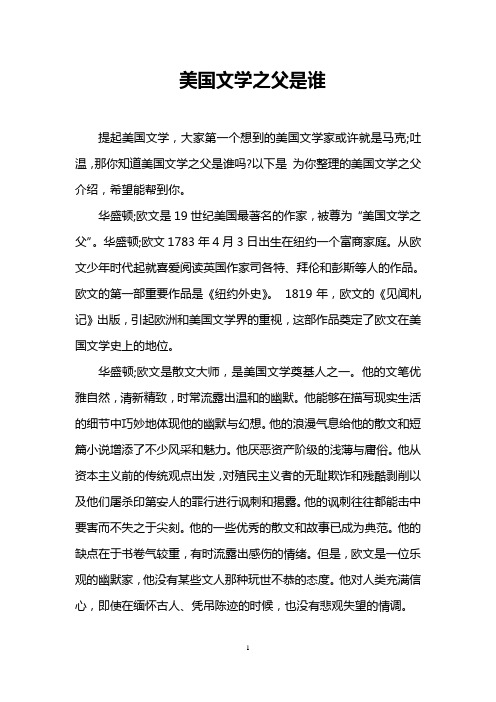
美国文学之父是谁提起美国文学,大家第一个想到的美国文学家或许就是马克;吐温,那你知道美国文学之父是谁吗?以下是为你整理的美国文学之父介绍,希望能帮到你。
华盛顿;欧文是19世纪美国最著名的作家,被尊为“美国文学之父”。
华盛顿;欧文1783年4月3日出生在纽约一个富商家庭。
从欧文少年时代起就喜爱阅读英国作家司各特、拜伦和彭斯等人的作品。
欧文的第一部重要作品是《纽约外史》。
1819年,欧文的《见闻札记》出版,引起欧洲和美国文学界的重视,这部作品奠定了欧文在美国文学史上的地位。
华盛顿;欧文是散文大师,是美国文学奠基人之一。
他的文笔优雅自然,清新精致,时常流露出温和的幽默。
他能够在描写现实生活的细节中巧妙地体现他的幽默与幻想。
他的浪漫气息给他的散文和短篇小说增添了不少风采和魅力。
他厌恶资产阶级的浅薄与庸俗。
他从资本主义前的传统观点出发,对殖民主义者的无耻欺诈和残酷剥削以及他们屠杀印第安人的罪行进行讽刺和揭露。
他的讽刺往往都能击中要害而不失之于尖刻。
他的一些优秀的散文和故事已成为典范。
他的缺点在于书卷气较重,有时流露出感伤的情绪。
但是,欧文是一位乐观的幽默家,他没有某些文人那种玩世不恭的态度。
他对人类充满信心,即使在缅怀古人、凭吊陈迹的时候,也没有悲观失望的情调。
华盛顿;欧文的作品:1、《纽约外史》(A History of New York,1809)2、《柑掌录》(即《见闻札记》)[The Sketch Book of Geoffrey Crayon, Gent.1819-1820])——其中收录《睡谷的传说》(The legend of the Sleepy Hollow)和《瑞普.凡.温克尔》(Rip Van Winkle)等名篇(《见闻札记》开创了美国短篇小说的传统)3、《布雷斯布里奇田庄》(Bracebridge Hall,1822)4、《旅人述异》(即《旅客谈》[T ales of a Traveller,1824])5、《哥伦布的生平和航行》(即《哥伦布传》[The Life and Voyages of Christopher Columbus,1828])6、《哥伦布同伴航海及发现》(Voyages and Discoveries of the Companions of Columbus,1831)7、《攻克格拉纳达》(The Chronicles of the Conquest of Granada,1829)8、《大食故宫余载》(即《阿尔罕伯拉》[T ales of the Alhambra,1832])9、《阿斯托里亚》(Astoria,1836)10、《哥尔德斯密斯传》(The Life of Oliver Goldsmith,1840 [revised 1849])11、《穆罕默德及其继承者》(Mahomet and His Successors,1850)12、《华盛顿传》(The Life of George Washington [5volumes],美国文学之父华盛顿;欧文的作品风格华盛顿;欧文向往田园生活和古代遗风,最爱写随笔和短篇小说,其主要作品的大部分题材都是欧洲的,极少描写美国的生活,作者尤其关注奇闻轶事和穷乡僻壤的风俗习惯。
introduct Washington_Irving华盛顿_欧文
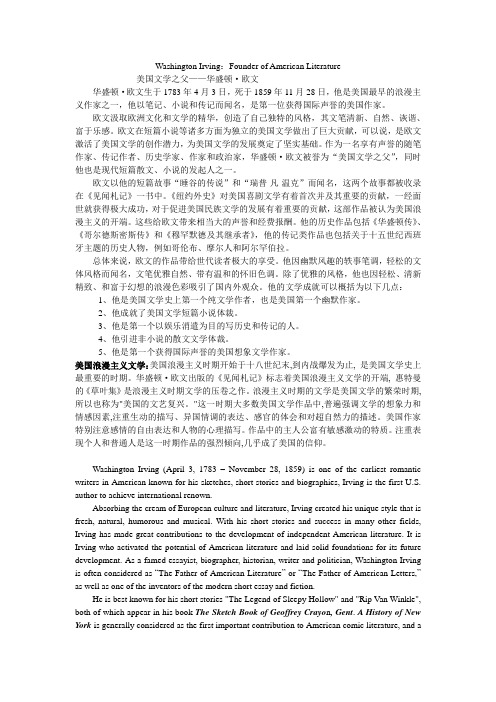
Washington Irving:Founder of American Literature美国文学之父——华盛顿·欧文华盛顿·欧文生于1783年4月3日,死于1859年11月28日,他是美国最早的浪漫主义作家之一,他以笔记、小说和传记而闻名,是第一位获得国际声誉的美国作家。
欧文汲取欧洲文化和文学的精华,创造了自己独特的风格,其文笔清新、自然、诙谐、富于乐感。
欧文在短篇小说等诸多方面为独立的美国文学做出了巨大贡献,可以说,是欧文激活了美国文学的创作潜力,为美国文学的发展奠定了坚实基础。
作为一名享有声誉的随笔作家、传记作者、历史学家、作家和政治家,华盛顿·欧文被誉为“美国文学之父”,同时他也是现代短篇散文、小说的发起人之一。
欧文以他的短篇故事“睡谷的传说”和“瑞普·凡·温克”而闻名,这两个故事都被收录在《见闻札记》一书中。
《纽约外史》对美国喜剧文学有着首次并及其重要的贡献,一经面世就获得极大成功,对于促进美国民族文学的发展有着重要的贡献,这部作品被认为美国浪漫主义的开端。
这些给欧文带来相当大的声誉和经费报酬。
他的历史作品包括《华盛顿传》、《哥尔德斯密斯传》和《穆罕默德及其继承者》,他的传记类作品也包括关于十五世纪西班牙主题的历史人物,例如哥伦布、摩尔人和阿尔罕伯拉。
总体来说,欧文的作品带给世代读者极大的享受。
他因幽默风趣的轶事笔调,轻松的文体风格而闻名,文笔优雅自然、带有温和的怀旧色调。
除了优雅的风格,他也因轻松、清新精致、和富于幻想的浪漫色彩吸引了国内外观众。
他的文学成就可以概括为以下几点:1、他是美国文学史上第一个纯文学作者,也是美国第一个幽默作家。
2、他成就了美国文学短篇小说体裁。
3、他是第一个以娱乐消遣为目的写历史和传记的人。
4、他引进非小说的散文文学体裁。
5、他是第一个获得国际声誉的美国想象文学作家。
美国浪漫主义文学:美国浪漫主义时期开始于十八世纪末,到内战爆发为止, 是美国文学史上最重要的时期。
华盛顿欧文的作品

华盛顿欧文的作品
华盛顿欧文是一位十分出色的美国文学家,尤其以其表现美国森
林和河流的优美描写而闻名。
他是19世纪最重要的散文作家,也是《扬·斯科特》和《树林与河流》这两部著名典籍的作者。
在散文作品中,华盛顿欧文使用细致、深入的观察使他的作品被
世人熟知。
他曾多次参加在美国的旅行,并将旅途的深刻感受与精彩
描述表达了出来。
在《河流和树林》一书中,他流畅细腻的描写了美
国的森林生态,以及河流的壮丽景观,加上他对自然的热爱以及对大
自然的赏识,使得这部作品深受读者喜爱。
此外,华盛顿欧文还塑造了家喻户晓的《扬·斯科特》一书,也
被誉为美国经典文学的代表作之一。
故事发生在波士顿,讲述了乐观
勇敢的扬·斯科特随着一支童年家庭船队一起出海探险,他最终决定
留在家园,从此热爱着波士顿的生活,而不是去寻找自己的海洋梦想。
这本书渗透了对家园深厚的怀念之情,并以美国的故事观念展现了丰
富的灵活性和精彩的情节。
华盛顿欧文的作品激发了世人对大自然的热爱和崇敬,他的作品
被世界所推崇,受到广泛的赞誉。
他的作品中,许多理念对现代社会
的发展起到了积极的推动作用,也成为许多文学作品的经典模板。
华盛顿欧文的作品
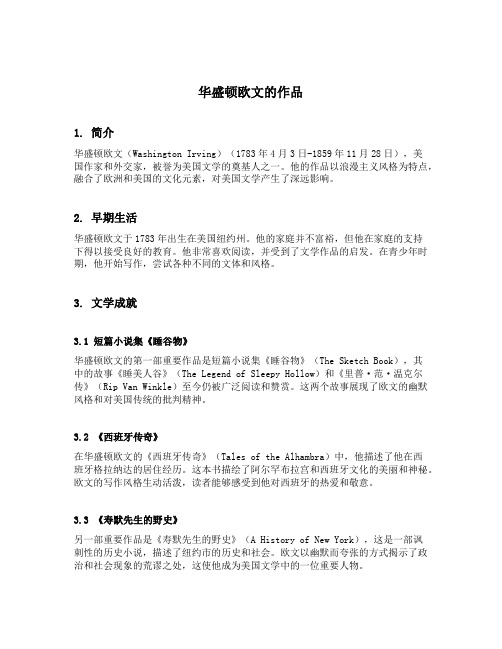
华盛顿欧文的作品1. 简介华盛顿欧文(Washington Irving)(1783年4月3日-1859年11月28日),美国作家和外交家,被誉为美国文学的奠基人之一。
他的作品以浪漫主义风格为特点,融合了欧洲和美国的文化元素,对美国文学产生了深远影响。
2. 早期生活华盛顿欧文于1783年出生在美国纽约州。
他的家庭并不富裕,但他在家庭的支持下得以接受良好的教育。
他非常喜欢阅读,并受到了文学作品的启发。
在青少年时期,他开始写作,尝试各种不同的文体和风格。
3. 文学成就3.1 短篇小说集《睡谷物》华盛顿欧文的第一部重要作品是短篇小说集《睡谷物》(The Sketch Book),其中的故事《睡美人谷》(The Legend of Sleepy Hollow)和《里普·范·温克尔传》(Rip Van Winkle)至今仍被广泛阅读和赞赏。
这两个故事展现了欧文的幽默风格和对美国传统的批判精神。
3.2 《西班牙传奇》在华盛顿欧文的《西班牙传奇》(Tales of the Alhambra)中,他描述了他在西班牙格拉纳达的居住经历。
这本书描绘了阿尔罕布拉宫和西班牙文化的美丽和神秘。
欧文的写作风格生动活泼,读者能够感受到他对西班牙的热爱和敬意。
3.3 《寿默先生的野史》另一部重要作品是《寿默先生的野史》(A History of New York),这是一部讽刺性的历史小说,描述了纽约市的历史和社会。
欧文以幽默而夸张的方式揭示了政治和社会现象的荒谬之处,这使他成为美国文学中的一位重要人物。
4. 文化影响华盛顿欧文通过他的作品对美国文学产生了深远影响。
他的风格和主题在后来的作家中得到了广泛的传承和发展。
他的作品对美国的文化认同和国家形象的塑造有着重要意义。
5. 总结华盛顿欧文是美国文学的先驱和奠基人之一,他的作品以浪漫主义风格和幽默风格为特色。
他通过讽刺和揭示人类社会的荒谬性,展示了对美国文化和传统的深入理解。
华盛顿欧文
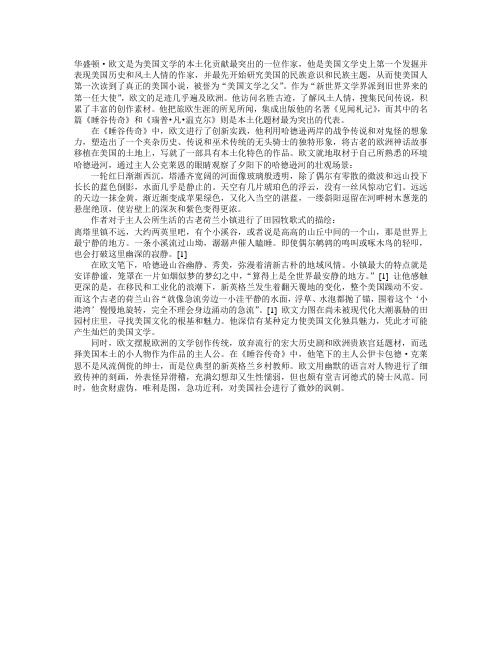
华盛顿·欧文是为美国文学的本土化贡献最突出的一位作家,他是美国文学史上第一个发掘并表现美国历史和风土人情的作家,并最先开始研究美国的民族意识和民族主题,从而使美国人第一次读到了真正的美国小说,被誉为“美国文学之父”。
作为“新世界文学界派到旧世界来的第一任大使”,欧文的足迹几乎遍及欧洲。
他访问名胜古迹,了解风土人情,搜集民间传说,积累了丰富的创作素材。
他把旅欧生涯的所见所闻,集成出版他的名著《见闻札记》,而其中的名篇《睡谷传奇》和《瑞普•凡•温克尔》则是本土化题材最为突出的代表。
在《睡谷传奇》中,欧文进行了创新实践,他利用哈德逊两岸的战争传说和对鬼怪的想象力,塑造出了一个夹杂历史、传说和巫术传统的无头骑士的独特形象,将古老的欧洲神话故事移植在美国的土地上,写就了一部具有本土化特色的作品。
欧文就地取材于自己所熟悉的环境哈德逊河,通过主人公克莱恩的眼睛观察了夕阳下的哈德逊河的壮观场景:一轮红日渐渐西沉。
塔潘齐宽阔的河面像玻璃般透明,除了偶尔有零散的微波和远山投下长长的蓝色倒影,水面几乎是静止的。
天空有几片琥珀色的浮云,没有一丝风惊动它们。
远远的天边一抹金黄,渐近渐变成苹果绿色,又化入当空的湛蓝,一缕斜阳逗留在河畔树木葱茏的悬崖绝顶,使岩壁上的深灰和紫色变得更浓。
作者对于主人公所生活的古老荷兰小镇进行了田园牧歌式的描绘:离塔里镇不远,大约两英里吧,有个小溪谷,或者说是高高的山丘中间的一个山,那是世界上最宁静的地方。
一条小溪流过山坳,潺潺声催人瞌睡。
即使偶尔鹌鹑的鸣叫或啄木鸟的轻叩,也会打破这里幽深的寂静。
[1]在欧文笔下,哈德逊山谷幽静、秀美,弥漫着清新古朴的地域风情。
小镇最大的特点就是安详静谧,笼罩在一片如烟似梦的梦幻之中,“算得上是全世界最安静的地方。
”[1] 让他感触更深的是,在移民和工业化的浪潮下,新英格兰发生着翻天覆地的变化,整个美国躁动不安。
而这个古老的荷兰山谷“就像急流旁边一小洼平静的水面,浮草、水泡都抛了锚,围着这个‘小港湾’慢慢地旋转,完全不理会身边涌动的急流”。
华盛顿欧文的历史故事

华盛顿欧文的历史故事华盛顿欧文(Washington Irving)是美国19世纪著名的作家和外交官。
他以他的短篇小说和对美国历史的贡献而闻名于世。
本文将重点介绍华盛顿欧文的生平经历和他对美国文学的重要影响。
华盛顿欧文于1783年4月3日出生在纽约市的曼哈顿。
他成长于一个富裕家庭,接受了良好的教育。
然而,他的家庭财务状况在他年轻时发生了变化,这迫使他开始将写作作为他的职业选择。
早期,华盛顿欧文以匿名的方式发表了许多短篇小说。
他的作品很受欢迎,特别是其中一部名为《睡美人山谷》(Sleepy Hollow)的作品。
这个故事以其中一个美国最为著名的文学形象——头戴着火鸟栈的骑士——而闻名于世。
这个故事也成为华盛顿欧文在美国文学史上的标志性作品之一。
除了文学作品,华盛顿欧文还涉足政治和外交。
他曾在英国担任过美国多个领事官职,期间他也致力于推动美国文学在国际上的发展。
他与英国著名作家乔治·戈登·拜伦有着深厚的友情,他也是英国文学界著名评论家的好友。
华盛顿欧文还以他的传记写作而闻名。
他最著名的传记作品是《哥伦布的生活和航海》(The Life and Voyages of Christopher Columbus)。
这本传记不仅详细地描述了哥伦布的历险经历,还深入探讨了哥伦布个人的情感和动机。
这本作品在当时引起了广泛的关注,并且被誉为美国文学史上的一部杰作。
除了《哥伦布的生活和航海》,华盛顿欧文还创作了其他一些传记作品,包括《摩尔多瓦的君主》(The Life of Mohammed)和《奥立弗·哥德史》(The Life of Oliver Goldsmith)。
这些传记作品不仅展示了华盛顿欧文作为作家的深度和广度,也为后来的传记写作树立了标杆。
华盛顿欧文对美国文学的贡献远不止于此。
他以他对美国历史和文化的独到洞察力而闻名于世。
他的作品《纽约州的历史》(A History of New York)刻画了纽约的历史和文化,并让美国人重新认识他们的家乡。
华盛顿欧文的简介

华盛顿欧文的简介欧文是散文大师,是美国文学奠基人之一,是19世纪美国最著名的作家。
欧文的作品是中国读者所熟悉和喜爱的。
下面是店铺搜集整理的华盛顿欧文的简介,希望对你有帮助。
华盛顿欧文的简介华盛顿·欧文(Washington Irving, 1783 年4 月3 日– 1859年11月28日)美国作家。
出生于纽约。
他的父亲是纽约富有的五金商人,长老会执事,政治上反对英国殖民统治;他敬重华盛顿,因而给儿子取名为华盛顿。
欧文幼年体弱多病, 16岁辍学,先后在几个律师事务所学法律,但对法律并没有兴趣,喜爱文学,从小喜欢看《鲁滨逊漂流记》、《格列佛游记》这种历险故事,还常常钻到剧院里去看戏。
欧文后来最知名的作品是《见闻札记》,写的就是在外游历的故事,不能不说是幼时受到了读书的影响。
1802年,19岁的欧文在《早晨纪事报》上发表了几篇书信体散文,崭露头角。
1804年因病赴欧洲休养,到过法国、意大利和英国,作了大量旅途笔记,为以后的创作积累了丰富的素材,一度想成为画家。
1806年回国后在弗吉尼亚州任律师,后帮助他的两个哥哥经营进口生意。
他对法律和经商之道都不甚精通。
这时他与律师霍夫曼的女儿玛蒂尔达订婚,妻子早逝于1809年,后来他虽有过几次恋爱,却一直过着独身生活。
华盛顿欧文的生平简介欧文的第一部重要作品是化名狄德里希·尼克尔包克尔所写《纽约外史》(A History of New York,1809年),作者自称它的主要目的在于“以逗趣的形式体现我们这个城市的传统;阐述本地人的脾性、风俗和特色;给本地的风光与场所以及熟悉的人物披上一层唤起想象力的怪念丛生的联想”。
书中讽刺了荷兰殖民者在纽约的统治,驳斥了殖民主义者为奴役和屠杀印第安人所制造的荒谬的论据。
这部作品受到欧美广大读者的欢迎,英国小说家沃尔特·司各特曾说,他从未读过这样酷似斯威夫特的风格的作品。
在这之前,美国虽然获得独立已有三十余年,但在文学方面却始终未能摆脱英国的束缚,创作出足以代表这个新兴资产阶级共和国的作品来。
英美文学之华盛顿欧文

英美文学之华盛顿欧文华盛顿·欧文(Washington Irving, 1783 年4 月3 日– 1859年11月28日)美国作家。
出生于纽约。
他的父亲是纽约富有的五金商人,长老会执事,政治上反对英国殖民统治;他敬重华盛顿,因而给儿子取名为华盛顿。
欧文幼年体弱多病,16岁辍学,先后在几个律师事务所学法律,但对法律并没有兴趣,喜爱文学,从小喜欢看《鲁滨逊漂流记》、《格列佛游记》这种历险故事,还常常钻到剧院里去看戏。
欧文后来最知名的作品是《见闻札记》,写的就是在外游历的故事,不能不说是幼时受到了读书的影响。
1802年,19岁的欧文在《早晨纪事报》上发表了几篇书信体散文,崭露头角。
1804年因病赴欧洲休养,到过法国、意大利和英国,作了大量旅途笔记,为以后的创作积累了丰富的素材,一度想成为画家。
1806年回国后在弗吉尼亚州任律师,后帮助他的两个哥哥经营进口生意。
他对法律和经商之道都不甚精通。
这时他与律师霍夫曼的女儿玛蒂尔达订婚,妻子早逝于1809年,后来他虽有过几次恋爱,却一直过着独身生活。
1807年,他和哥哥威廉等人共同创办一种不定期刊物《杂拌》,沿袭18世纪英国作家乔纳森·斯威夫特、亨利·菲尔丁以及约瑟夫·艾迪生和理查德·斯梯尔的《旁观者》的传统,开始了他的文学创作活动,显露出他的幽默、风趣和含蓄的讽刺才能。
欧文的第一部重要作品是化名狄德里希·尼克尔包克尔所写《纽约外史》(A History of New York,1809年),作者自称它的主要目的在于―以逗趣的形式体现我们这个城市的传统;阐述本地人的脾性、风俗和特色;给本地的风光与场所以及熟悉的人物披上一层唤起想象力的怪念丛生的联想‖。
书中讽刺了荷兰殖民者在纽约的统治,驳斥了殖民主义者为奴役和屠杀印第安人所制造的荒谬的论据。
这部作品受到欧美广大读者的欢迎,英国小说家沃尔特·司各特曾说,他从未读过这样酷似斯威夫特的风格的作品。
Washington Irving 华盛顿欧文汇总

❖ However, due to length constraints, these characteristics and devices generally may not be as fully developed or as complex as those developed for a fulllength novel.
❖ By the time when he was 23 years old (1809),he had roamed England, Holland, France Italy and Hudson Valley.
Life Experience
❖ After collecting sufficient original materials for writing and a good practice of editing a journal ,he formed his particular political idea and writing style.
Short stories/Essays
Title
The Life and Voyages of Christopher Columbus
The Chronicles of the Conquest of
Gபைடு நூலகம்anada
Voyages and Discoveries of the Companions of Columbus
Genre
Observational Letters
《华盛顿·欧文》课件

欧文的文学作品
《自然史》
这部作品是欧文最重要的随笔 集之一,以幽默、讽刺的方式 描绘了当时的社会、文化和人 性。
《恶魔之子》
这本小说展示了欧文对人性黑 暗面的深入探索,以及对社会 伦理和道德观念的短篇 小说之一,讲述了一家人如何 面对生活中的挫折和困难。
《华盛顿·欧文》PPT课件
华盛顿·欧文是美国19世纪著名的作家和文化评论家。他的作品和思想对美国 文学和文化产生了深远的影响。
介绍华盛顿·欧文
生平简介
华盛顿·欧文(1783-1859)是美国文艺复兴时期最重要的作家之一。他是纽约文学界的重 要人物,也是美国第一批文学评论家之一。
主要成就
欧文是美国文学史上第一位获得国际声誉的作家,他的作品展示了美国人民的精神和价值观, 深受读者喜爱。
欧文的重要性和意义
欧文是美国文学史上的重要人物,他的作品和思想依然具有深远的现实意义。
2
欧文对现代文学和文化的影响
欧文的作品对现代文学和文化产生了巨大影响,激发了许多作家和艺术家的创作 灵感。
总结
华盛顿·欧文对美国文化的巨大贡献
欧文的作品塑造了美国的文化形象,成为美国文学史上的重要一环。
欧文的思想和作品对现代文化的影响
欧文的思想和作品影响了现代文化,促进了自由、平等和多样性的推进。
欧文对美国文化的影响
1 对美国文学的贡献
欧文的作品开创了美国独特的文学风格,影响了后来的作家和文化运动。
2 对美国文化认同的影响
欧文强调了美国文化的独特性和独立精神,促进了对美国国家认同感的形成。
欧文的现代意义
1
欧文思想的现代应用
欧文的思想和观点在现代社会仍然具有重要意义,如他对自由、平等和人权的追 求。
华盛顿欧文英文介绍

04
Washington Irving's Style and
Characteristics
Unique sense of humor
His humor was often wry and self deprecating, making fun of his own appearance or character This self-awareness and ability to poke fun at himself have his stories a unique charge that was both charging and smoking
Introduction of the natural in culture
Irving's works were among the first to introduce the natural in culture, a trend that has persisted in global culture
Later Works
Over the course of his career, Irving pending numerical works across various genres, including biographies, novels, short stories, and travel narratives His most rapid works include "The Legend of Sleep Hollow" and "Rip Van Winkle," both of which are considered to be among the most ionic short stories in American literature
华盛顿.欧文doc

华盛顿·欧文(1783—1859)是美国短篇小说家、散文家、诗人、游记作家和传记作家,在文学史上素有“美国短篇小说之父”的美称。
欧文有很多笔名,“狄德里希·尼克尔包克尔”和“杰弗里·克雷翁”,是欧文讲故事时最喜欢使用的替身。
欧文出生在纽约,是家里十一个孩子中最小的。
父亲是富商,母亲是英国人。
据传说,乔治·华盛顿曾经遇见欧文,以自己的名字给他命名,并给他祝福。
后来欧文创作了他最伟大的作品之一《乔治·华盛顿传》。
欧文从小酷爱读书,尤其喜欢英国浪漫主义作家的作品。
1804至1806年,欧文在欧洲游历了两年;1815至1832年,他旅居欧洲达十七年之久,欧洲成了他的第二故乡和取之不尽的创作源泉。
因此他的作品与古老的欧洲文化有着斩不断的渊源,读者能够从中领略到浓郁的欧陆风情。
《睡谷的传说》所选的欧文短篇小说,都是欧文最优秀的作品,有的一向脍炙人口,如《闹鬼的屋子》、《瑞普·凡·温克尔》和《鬼新郎》等等。
这些小说具有很强的纯文学性、休闲性和娱乐性。
欧文小说的背景通常设置在远离尘嚣的荒僻村野,一些着魔闹鬼的地方,静谧中带着神秘、奇诡和深沉的气息,像一幅幅古色古香的油画,使人着迷,让人感到回味悠长。
《睡谷的传说》中,欧文是这样给我们描述“睡谷”的:“离开这个村庄不远,大约两英里路光景,在高山之间,有一个小山谷,或者不如说,一块凹地,它算得上是全世界最安静的地方。
一条小溪穿谷而过,汩汩的水声刚好催人入梦,偶尔一声鹌鹑的轻啼,或者啄木鸟…得得‟啄木的声音,几乎就是打破这万籁俱寂的气氛的惟一的声响了。
”这里“仿佛有一种昏沉沉、令人思睡的力量笼罩着整个山谷,甚至渗透了那儿的空气。
”在这样的自然氛围下,作者又加入了自己童年时代打松鼠的回忆和感受。
他说,一天正午,他溜达进一片高大的胡桃树林,听到自己的枪声打破了四周的寂静,连自己也吃了一惊。
他随即想道:“要是有一天,我想退隐,逃避纷纭的俗世,在恬静的梦中度过烦恼的余生,我真不知道还有什么地方会比这个小小的山谷更使我满意的了。
- 1、下载文档前请自行甄别文档内容的完整性,平台不提供额外的编辑、内容补充、找答案等附加服务。
- 2、"仅部分预览"的文档,不可在线预览部分如存在完整性等问题,可反馈申请退款(可完整预览的文档不适用该条件!)。
- 3、如文档侵犯您的权益,请联系客服反馈,我们会尽快为您处理(人工客服工作时间:9:00-18:30)。
方案一:浅析华盛顿欧文作品奇幻色彩的渲染
浅析欧文作品中的哥特风
一、华盛顿生平
1,家庭生活的影响
2,早期学习经历的影响(喜爱的作家对其的影响、文学的影响)
二、其写作风格、特点(独特的哥特风写作风格)
哥特风里夹杂着讽刺幽默元素,不至于使这种哥特风格单一凝重。
一、华盛顿欧文简介
1、生平及作品
欧文幼年体弱多病,16岁辍学,先后在几个律师事务所学法律,但对法律并没有兴趣,从小喜爱文学,爱看《鲁滨逊漂流记》、《格列佛游记》这种历险故事,还常常钻到剧院里去看戏。
欧文年轻时曾在《早晨纪事报》上发表了几篇书信体散文,崭露头角。
21岁时因病赴欧洲休养,到过法国、意大利和英国,作了大量旅途笔记,为以后的创作积累了丰富的素材,一度想成为画家。
二、主要作品
两年后回国,在弗吉尼亚州任律师,后帮助他的两个哥哥经营进口生意。
他对法律和经商之道都不甚精通。
1807年,他和哥哥威廉等人共同创办一种不定期刊物《杂拌》,沿袭18世纪英国作家乔纳森·斯威夫特、亨利·菲尔丁以及约瑟夫·艾迪生和理查德·斯梯尔的《旁观者》的传统,开始了他的文学创作活动,显露出他的幽默、风趣和含蓄的讽刺才能。
Salmagundi was a moderate success, spreading Irving's name and reputation beyond New York.
In its seventeenth issue, dated November 11, 1807, Irving affixed the nickname "Gotham"—an Anglo-Saxon word meaning "Goat's Town"—to New York City.[18]
In late 1809, while mourning the death of his seventeen-year-old fiancée Matilda Hoffman, Irving completed work on his first major book, A History of New-York from the Beginning of the World to the End of the Dutch Dynasty, by Diedrich Knickerbocker (1809), a satire on
self-important local history and contemporary politics.
Prior to its publication, Irving started a hoax akin to today's viral marketing campaigns; he placed a series of missing person adverts in New York newspapers seeking information
on Diedrich Knickerbocker, a crusty Dutch historian who had allegedly gone missing from his hotel in New York City. As part of the ruse, Irving placed a notice—allegedly from the hotel's
proprietor—informing readers that if Mr. Knickerbocker failed to return to the hotel to pay his bill, he would publish a manuscript Knickerbocker had left behind.[19]
欧文的第一部重要作品是化名狄德里希·尼克尔包克尔所写《纽约外史》(A History of New York,1809年),作者自称它的主要目的在于“以逗趣的形式体现我们这个城市的传统;阐述本地人的脾性、风俗和特色;给本地的风光与场所以及熟悉的人物披上一层唤起想象力的怪念丛生的联想”。
书中讽刺了荷兰殖民者在纽约的统治,驳斥了殖民主义者为奴役和屠杀印第安人所制造的荒谬的论据。
这部作品受到欧美广大读者的欢迎,英国小说家沃尔特·司各特曾说,他从未读过这样酷似斯威夫特的风格的作品。
在这之前,美国虽然获得独立已有三十余年,但在文学方面却始终未能摆脱英国的束缚,创作出足以代表这个新兴资产阶级共和国的作品来。
欧文运用本国题材写出的《纽约外史》这部具有民族特色的作品,对于促进美国民族文学的发展有着重要的意义。
《纽约外史》虽风靡一时,而欧文并没有进一步发挥他的文学创作才能。
此后10年,一直在帮助他的哥哥经商,1815年欧文去英国利物浦在他哥哥所开设的分行工作;1818年分行因经济萧条而倒闭,欧文留居英国,以写作为生。
1820年,欧文将他游遍英国的名胜古迹,怀着对英国古老文明的仰慕和对从前资本主义社会的向往,陆续发表许多散文、随笔和故事,共32篇;结集为《见闻札记》(A Sketch Book)出版,以幽默风趣的笔调和富于幻想的浪漫色彩,描写了英国和美国古老的风俗习惯以及善良淳朴的旧式人物。
引起欧洲和美国文学界的重视。
这部作品奠定了欧文在美国文学史上的地位。
其中的散文《威斯敏斯特教堂》、短篇小说《瑞普·凡·温克尔》和《睡谷的传说》等,都是脍炙人口至今不衰之作。
之后,欧文写了体裁相似的《布雷斯布里奇田庄》(Bracebridge Hall,1822年)和故事集《旅客谈》(Tales of a Traveller,1824年),这两部作品都较《见闻札记》逊色。
1826年在马德里任美国驻西班牙大使馆馆员。
搜集了许多有关哥伦布的珍贵资料,游历了格拉纳达的名胜,并在阿尔罕伯拉宫逗留了将近三个月。
这一切激起了他对研究西班牙历史的兴趣。
1929年前后,他写了三部有关西班牙的著作:1828年发表《哥伦布的生平和航行》(The Life and Voyages of Christopher Columbus)。
1829年发表《攻克格拉纳达》(The Chronicles of the Conquest of Granada);同年出版游记、随笔和故事集《阿尔罕伯拉》(Tales of the Alhambra,1832年)。
欧文在《阿尔罕伯拉》中以优美的笔调描绘西班牙险峻而悲凉的荒山原野,具有南国情调的幽雅的园林,质朴豪爽的西班牙人民及其风俗人情,同时也生动地叙述了西班牙民间和历史上有关摩尔人的神话和传说。
在《阿拉伯星占家的传说》里,欧文利用一个流传很广的传说,揭露了侵略成性的统治者阿本·哈巴兹残忍荒淫的面目,以及道貌岸然、以哲人自居的星占家的卑鄙丑恶的灵魂。
在《摩尔人遗产的传说》里,欧文塑造了朴实勤劳、见义勇为的卖水的贩子柏勒吉尔,与贪婪暴戾的法官和警察作对比。
欧文曾任美国驻英公使馆秘书。
牛津大学曾授予其名誉法学博士学位,英国皇家学会也向他颁发了勋章。
1832年欧文回到美国,在纽约受到热烈欢迎。
由于读者迫切需要他描写本国的生活,他曾到新开发的美国西部进行考察,写了《草原游记》。
他还根据大皮货商约翰·雅各布·阿斯特提供的材料。
为这个大财阀写了一部发家史:《阿斯托里亚》(1838年)。
1842年再度赴马德里,出任美国驻西班牙公使。
1846年回国,晚年是在他曾经描写过的睡谷附近度过。
这一时期他的主要作品是3部传记:《哥尔德斯密斯传》(The Life of Oliver Goldsmith,1840年)、《穆罕默德及其继承者》(Mahomet and His Successors,1849-1850年)和5卷本《华盛顿传》(The Life of George Washington (5 volumes),1855-1859年)。
其中以《哥尔德斯密斯传》写得较好。
欧文于1859年11月28日逝世。
美国人民为了怀念这位在文学方面做出突出贡献的作家,在纽约下半旗致哀。
华盛顿·欧文是19世纪美国最著名的作家,1783年4月3日出生在纽约一个富商家庭。
欧文从少年时代起就喜爱阅读英国作家司各特、拜伦和彭斯等人的作品。
欧文的第一部重要作品是《纽约外史》。
1820年,欧文的《见闻札记》(The Sketch Book of Geoffrey Crayon, Gent.1819-1820 )出版,引起欧洲和美国文学界的重视,这部作品奠定了欧文在美国文学史上的地位。
华盛顿·欧文幼年体弱多
病, 16岁辍学,先后在几个律师事务所学法律,但对法律并没有兴趣,喜爱文学,爱漫游。
1804年因病赴欧洲休养,到过法国、意大利和英国,一度想成为画家。
1806年回国后在弗吉尼亚州任律师,后帮助他的两个哥哥经营进口生意。
这时他与律师霍夫曼的女儿玛蒂尔达订婚,妻子早逝于1809年,后来他虽有过几次恋爱,却一直过着独身生活。
2、作品风格
三、形成哥特风写作风格的原因
四、与其他哥特风作家作品的对比(与爱伦坡写作风格的对比)
1 环境
2 语言
五、总结(对美国及世界文学的影响)
方案二:柳林风声
浅析柳林风声中獾先生的形象
一、作者及作品简介
二、獾先生所体现的作者的思想
三、獾先生在文中所起的作用。
